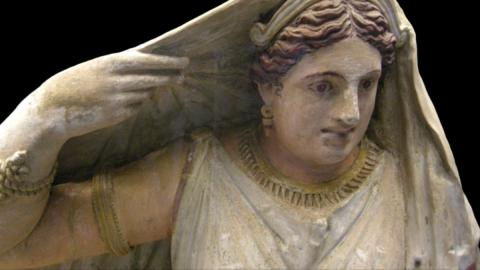Joy Connolly
February 15, 2019
Like many others, I'm trying to funnel the anger and frustration that I felt at our panel on the "Future of Classics" at the Annual Meeting in San Diego toward taking action that can make a difference, even on a small scale. At the panel Professor Sarah Bond and Professor Dan-el Padilla Peralta promptly condemned the comments a speaker from the audience made about Dan-el as well as her intellectually and politically regressive defense of classical studies. My thoughts here are intended to carry forward their energetic advocacy.
To combat racist attitudes and assumptions that persist not only at the margins of the field but among and around us, we must act now on our home campuses and schools. Here are five ideas to get us started. There are many more. It’s important to note that at some schools, faculty and students are already acting on these ideas or better versions of them. They arise from my experience as a university administrator, where I've seen countless discussions about diversity go in circles until faculty, students, and staff commit together to do specific things within a short time frame. They are designed for use at college and university campuses, the world I know best, but K-12 teachers and scholars are included here, and I welcome ideas from this crucially important sector of our field.
Ideas for action in the coming 30-60 days
For departments undertaking searches
During your phone/skype interviews or campus visits in the next 30-60 days, instead of asking candidates “What are your plans for your next article?” ask:
- How do you represent the field to students who have no experience with Classics or whose experiences make them suspicious of the field?
- How does your awareness of the field's history of exclusion affect your course planning and syllabus design?
- What are your plans for attracting students of color and students who have had no exposure to classical studies to your courses?
Don't make these on-the-spot questions; give the candidates time to think them over.
Agree together as a department in advance (this may take some discussion) that your final deliberations will give serious weight to the candidates’ answers. As soon as possible, and ideally before the campus visits begin, ensure that your chair tells the dean or other relevant administrative decision-maker about the events at the San Diego SCS and their transformative impact. This will be helpful purely in terms of letting the administration understand you better, but particularly in the event that one of your candidates has impressive, compelling answers to the questions above but has published only one article, vel sim.: before the final vote, when someone expresses worry that this candidate might be less well placed for a successful tenure bid, the chair will be able to say that the dean is informed about and approves the department's commitment to hiring someone who promises to attract diverse students and cultivate innovative approaches to the field.
Graduate admissions
When discussing application files, instead of asking “How many years of Greek and Latin (or Greek/Roman history/archaeology) has this student taken?” (with all the attendant assumptions about commitment and seriousness these questions have historically entailed), ask:
- What does this student bring to the field that is new and that enhances our collective study and research as well as the classroom experience of our undergraduates, whom this doctoral student will teach?
Classical studies will not thrive if it welcomes to graduate school only students who through luck or privilege or both have had access to Greek and Latin in college, let alone high school. When you encounter the application of a student who shows promise but has not studied Greek and Latin at the level the program currently requires, ask the graduate dean for funds to send the student to the CUNY Latin and Greek Institute (where scholarships are available thanks to the generosity of the Niarchos Foundation), the Berkeley Summer Workshop, or a comparable language program for one or two summers. If the answer is no, check that the dean is going the extra mile to understand the particular challenges facing Classics and is helping you work creatively. For instance, ask if s/he will allow you to re-purpose the cost of some visiting speakers toward language training -- if not this year, next year. (Then invite your speakers to give their talks by video, explaining that you are putting funds for hotel and travel toward recruiting a diverse graduate cohort.) Make your commitment and your recruitment efforts visible to the administration, and make sure they understand you will put funds to good use with a clear and accountable plan. If zero funds are available, rethink your doctoral curriculum. You will likely be well served by rethinking your doctoral curriculum in any case.
Doctoral curriculum
Charge the departmental curriculum committee to hold its first reform meeting in 30 days, the goal being in 18 months to creatively design a doctoral program that faces the reality that very, very few students these days apply to graduate school with multiple years of Greek and Latin language study, and those that have those years of experience typically belong to a talented but simply too small a group. If we restrict doctoral education even to students with 1-2 years of Latin and Greek, we are already guarding too narrow a gateway. We should make the field accessible at the doctoral level to smart students from a range of undergraduate majors and from schools that have no Classics major and no Greek or Latin language courses.
Craft a doctoral curriculum that:
- includes funded opportunities for students interested in literature to learn Greek and Latin intensively in their first two to three years of graduate school at external programs, including summer programs, and/or
- draws on the expertise of colleagues in linguistics and language pedagogy to build into your own curriculum language training that functions at the advanced level of critical thinking and analysis suitable for graduate students, and/or
- requires students focused on visual culture, history, or archaeology not to study Greek and Latin but to learn the fundamental skills required for those fields in the twenty-first century. This is just the tip of the iceberg of curricular reform (one could ask many deeper and more disruptive questions about research and its goals: see #4)
- includes required opportunities, e.g. at the proposal defense, for master’s and doctoral students to reflect on their choice of research topic for the thesis or dissertation. Ask: What intellectual and professional motivations pushed me to choose my topic? Does it revisit old questions in ways that are responsive to the upcoming generation of students and scholars? Am I taking the opportunity to explore new terrain, for example, neo-Latin texts that have never been translated? [This is the topic of another post, but it is the responsibility of hiring committees to value research on non-canonical texts and topics. We may always teach Vergil or Cicero in our introductory courses, but we should hire people working on Erasmus who will teach the ancient authors as a matter of course.] Professors at all levels should also ask these questions.
Partnerships
Agree in the department that at least two colleagues contact a neighbor within 30 days – ideally your colleagues in another department with a stronger record of diversity and inclusion (your dean can help you identify them) or faculty teaching Latin, Greek, or Greek and Roman history or related fields at the closest high school or grammar school. Many pre-college programs are thriving. What can you do to build on their success? Set up a lunch or coffee in the next 60 days where students and faculty discuss what you are all doing locally to make undergraduate classes and departments more intellectually and atmospherically welcoming places. Make sure your administration knows you're doing this; put it on your website; take notes and put at least one new idea into action by summertime. Do it again next semester, and the next, and so on.
Budget requests
In many institutions, the coming 60 days is the season for department chairs to develop budget requests for the coming academic year: hiring, OTPS (Other Than Personnel Services, e.g. funding for visiting lectures), and student support. Even if it is not explicitly asked of your department (and many deans are asking for diversity-promoting ideas these days), collectively and proactively develop and submit in 60 days a request to your dean for funds that will assist the department in diversifying Classics: for example, expenses for outreach to local grammar or high schools, summer scholarships, a post-doctoral fellowship, a new tenure-track line. Given the budget constraints in place at almost every institution, this request will probably be met with a no, but it will put you on the administration's radar as a proactive partner in the work of diversifying the school and the field, and in wealthier schools, it may garner you useful funding.
Which actions will you take?
I would like to see the SCS play a role as a clearinghouse for institutional efforts like those collected by Sarah Bond here. I hope this post starts a positive, action-oriented thread. The Future of Classics panel was a sharp personal reminder to me of how much work I need to do. If we want to change, we must start now.
Header Image: The polychrome Etruscan sarcophagus of Seianti Hanunia Tlesnasa lifting a veil from her face (150-140 BCE now at the British Museum, via Wikimedia under a CC-BA-SA-3.0).
Authors


